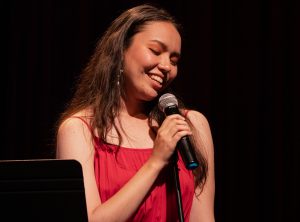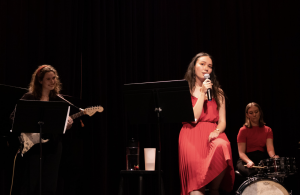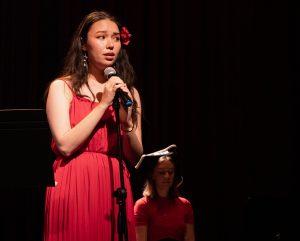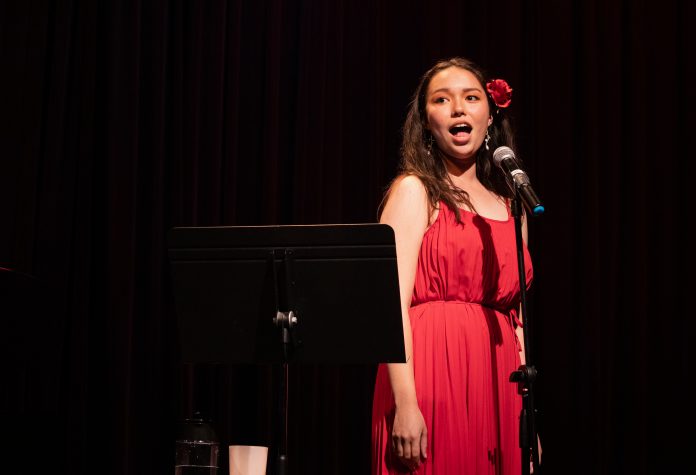April 15 and 16, Sumié Yotsukura ’22 presented “Your Best (Asian) American Girl” as a part of her senior thesis at the Williamsburg Regional Library Theater. It was directed by Christopher Michael Richardson ’13. The cabaret chronologized her lifelong interest in musical theater, from a young child who wanted to see herself as a princess, to a woman who had become aware of how Asians have been underrepresented in the field she wanted to devote her life to. Throughout the hour-long show, Yotsukura performed songs and monologues framed through her personal experiences as a biracial third-generation Japanese American girl.
Even though Yotsukura herself did not write the music she performed (though she made occasional adjustments to some lyrics), the songs still felt deeply intimate. The song, each chosen from a different musical holding a specific personal meaning across different points in time, seemed to fit in well with each other. She began with reflections on her younger self, who first became exposed to musicals in a theater, and started off with “Shall We Dance” from “The King and I.”
After singing, Yotsukura explained the significance of this song, which she saw as encapsulating the feeling of falling in love. She shared that ever since she was a little kid, she has always wanted to go to a ball and get asked to dance by a handsome stranger.

“And since I was a little kid, I’ve known one thing, and one thing for certain: and that is that, it is women like Anna, and princesses, that get asked to dance,” Yotsukura said.
But it is this image of princesses that poses tension as she gets older, when she remarks on how she came to realize the lack of Asian representation on stage. As a child, she saw herself as being able to change her race between “Japanese” and “American,” with “white” not being part of her vocabulary, and musicals were firmly situated as being her “American” side. As she grew older, she contended with the knowledge that people who looked like her were underrepresented on the stage.
“It was when I was beginning high school that for the first time, I saw a musical with Asian characters, Asian cast,” Yotsukura said. “When I was fifteen years old, I saw “The King and I” for the first time. […] Here, for the first time, I was seeing people on stage doing what I wanted to do, and […] kind of looked like me. Not just dark hair, but […] faces, and eyes that looked like mine. And backgrounds like mine.”
“Here, for the first time, I was seeing people on stage doing what I wanted to do, and […] kind of looked like me. Not just dark hair, but […] faces, and eyes that looked like mine. And backgrounds like mine.”
Audience member Tomás Sommer ’22 reflected on the depth of thought that was clearly put into creating this show to represent all of what Yotsukura sees as her background.
“She’s very intentional about telling her own story, balancing the two sides of her identity, being white, or American, and being Japanese,” Sommer said.

Later, while auditioning for college in New York, Yotsukura described watching “Miss Saigon.” Up to that moment, she had never played an Asian role in any musical she had participated in, so she eagerly waited to watch this musical. Unfortunately she found herself disappointed by the somewhat one-dimensional portrayal of Kim and found herself connecting more strongly with Ellen, the white wife. This recollection led to a beautiful rendition of “Now That I’ve Seen Her” from “Miss Saigon,” which was sung in the musical by Ellen.
Yotsukura explained how she felt like she could not be herself when portraying Asian characters, since they often came with stereotypes she did not identify with. This conflict clashed with her own understanding of herself.
“I grew up never seeing someone who looked like me in a fairy tale getting a happy ending, getting asked to the dance,… so I thought nobody would ever be interested in hearing my story,” Yotsukura said. “But I do have a story. It’s only been through music, through songs, that I’ve been able to understand what that story is, what it could be.”
“But I do have a story. It’s only been through music, through songs, that I’ve been able to understand what that story is, what it could be.”
Yotsukura ended the cabaret with “Your Best American Girl” by Mitski, a biracial Japanese American artist. The song expresses anxieties about not being a typical white American girl and how the singer chooses to overcome them with pride in how her mother raised her.
Audience member Madison Sasman ’22 expressed the power of Yotsukura not waiting to be asked to tell her story, but rather putting herself out there.
“In fact, this is the first time she’d ever really been able to do that in this capacity,” Sasman said. “It felt like…an honor to be able to watch that.”
As for the technical aspects of the play, it was clear from the start that Yotsukura was a well-trained singer. She never failed in conveying emotion through her songs, whether it was excitement, sadness or uncertainty. Her accompanists did a great job in helping flesh out the songs. Colin Carmody ’22, who also was involved in music direction, was fantastic as a piano accompaniment, and his transitions as Yotsukura went from one song to the next were impressively smooth.
Other instrumentalists included Sarah Russell-Hunter ’23 on violin, Sarah Chopko ’22 on percussion and Maggie Sheridan ’22 on guitar. Sheridan, who had personally known Yotsukura for four years, had been excited to perform in the cabaret.
“It’s just such a big honor to have any sort of part in this because I know how important it is to her and her sense of self, […] ideas and performance,” Sheridan said.

In another interesting theme throughout the cabaret, Yotsukura expressed her complicated feelings about her Japanese heritage. When Yotsukura was 10 years old, she was told that she was moving to Japan. This created new challenges since she felt like she was ripped away from musical theater, which she associated as a purely American artform.
“I refused to call it home the entire time,” she said, regarding her experiences in Japan. “I hated it. I refused to find anything to love in it.”
When she returned to America after middle school, she told herself she would never speak Japanese again. Years later, after becoming deeply touched by a version of “Country Road” featured in the Studio Ghibli film “Whisper of the Heart” — where, in the context of the movie, a Japanese girl from Tokyo attempts to use the nostalgic American melody with Japanese lyrics — Yotsukura sung the song in Japanese, the few English words spoken with a Japanese accent. It was a startling reflection of how much she’d grown since then.
Even then, however, Yotsukura seemed to express lingering discomfort with some aspects of Japan: she mentioned that she still avoided any hanami invitations her family extended, though she did feel nostalgia when she saw cherry blossoms, this symbol of Japan in America.
It was not a straightforward story, but it was candid, and this type of honesty was what the entire show felt balanced upon.


[…] Read more – FLATHATNEWS.COM […]